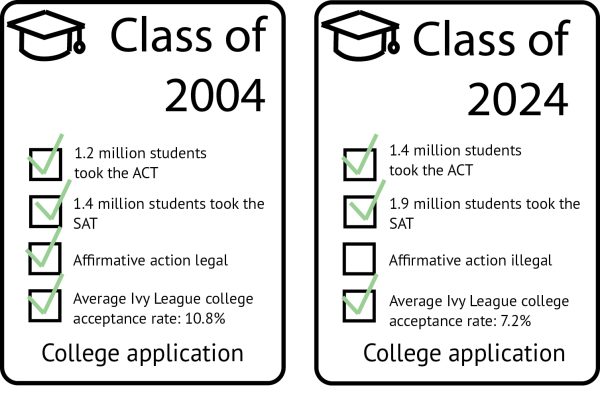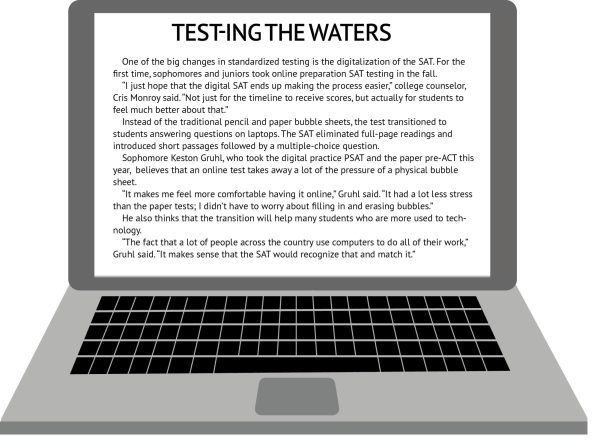A majority of juniors took both the school-day SAT and ACT tests this March. With several prominent schools,like Yale and Dartmouth, returning to a test-mandatory application process, college applications are becoming increasingly complicated. For some students, these tests matter more than ever.
“As someone who went through the college admissions process,” senior Kyan Rosenthal said. “I know it can be really hard to navigate the changing testing landscape.”
During COVID-19, universities stopped requiring students to submit test scores due to a lack of access and ability to take them. Associate Director of College Counseling Britten Nelson saw student interest increase for schools that used to require higher test scores when they switched to test-optional.
“A lot more students applied to places where previously they wouldn’t have because they saw that their test scores were so much below the average,” Nelson said. “So I think it made it so students were applying to harder to get into places because a barrier had been removed.”
Test-optional schools turned their focus to personal writing.
“They have put more emphasis on writing, so the kids are having to write a lot more essays,” Nelson said.

According to Kelly Herrington, director of college counseling and student services, schools reintroduced the tests because they can be beneficial for some applicants who would have performed well despite coming from an underrepresented demographic.
“They felt that standardized testing was a way for them to really elevate students who sometimes are overlooked, historically,” Herrington said. “And having that testing would have helped those students in the process.”
Dartmouth is reintroducing standardized tests based on research performed by the school.
According to a statement sent to all students and on the school’s website, “Our overall conclusion is that the use of SAT and ACT scores is an essential method by which Admissions can identify applicants who will succeed at Dartmouth. Importantly, these test scores better position Admissions to identify high-achieving less-advan
taged applicants and high-achieving applicants who attend high schools for which Dartmouth has less information to interpret the transcripts.”
Rosenthal sees tests as a way for colleges to understand a student’s application better.
Colleges have so little time to read your application and understand all about you,” Rosenthal said. “I would think a test score offers a universal way to understand more about you as a student.”
Herrington also believes that standardized tests perform as an equalizer among students from all over the country who have different school experiences.
“We’ve seen an uptick in students receiving A’s and B’s, and trying to make sense of all the different grading systems that are out there can be challenging,” Herrington said. “With so many students having high GPA’s, how do you really know the value of that GPA and what it’s worth?”
They felt that standardized testing was a way for them to really elevate students who sometimes are overlooked. — Kelly Herrington
Nelson reiterates the equality that the tests provide.
“Standardized tests as flawed as they are, at least every kid across the country is taking the same test,” Nelson said.
Junior Mian Oliver sees the advantages of taking the tests whether or not one plans on applying to a school that requires it.
“They benefit people who were going to submit their test scores no matter the college,” Oliver said. “If you got an average test score or a good test score and you’re going to submit anyway, then it helps your application.”
UPrep also works to create accessible opportunities for students to take the ACT and SAT now that testing is more important than in recent years.
“Andit’s really convenient that they are both at school,” Oliver said. “So, it’s not any extra work for me to go sign up at a testing center because it is already here.”
While the SAT and ACT have gained attention since more schools are requiring them, the college counselors believe students’ are too worried abouttests.
 “I think that sometimes students think that testing is the mostimportant piece of their application if they’re applying to a school that is requiring it or is test-optional,” Herrington said. “But it’s always those other factors before the testing that come into play.”
“I think that sometimes students think that testing is the mostimportant piece of their application if they’re applying to a school that is requiring it or is test-optional,” Herrington said. “But it’s always those other factors before the testing that come into play.”
Nelson stresses that test scores are just another data point for schools.
“While they might not be as predictive of future success in college, when you use test scores plus writing plus GPA and transcripts, you have a much better predictor of future success,” Nelson said.

Associate Director of College Counseling Cris Monroy previously worked as an admissions officer at Pomona College in Claremont, California, and is in his first year at UPrep
He believes that schools transitioning back to requiring tests complicates the process for students.
“It puts us in a situation where we are torn,” Monroy said. “Because now in order to apply to those schools, [students] have to test and they have toprepare and the difficulty comes back because some students you know, who aspire to those type of institutions will still not be able to get the appropriate preparation. Even though, some of those students may have been admitted in a test optional policy.”
Students encounter more difficulties as some of their desired schools revert to a test-mandatory.
“I was going to take at least one test anyway, so it doesn’t affect me as I imagine it affects some people,” Oliver said. “But if you weren’t going to take a test and the school you want is now requiring a score, it can really mess things up.”
Herrington emphasizes the fact that scores in standardized tests are often overvalued.
“It doesn’t measure your heart or your character or your ability to generate your own ideas,” Herrington said.




